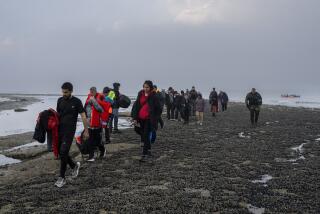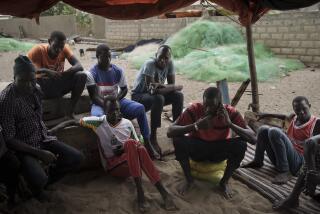Moroccans risking all to get to Spain
- Share via
ABI JAAD, MOROCCO — As vacationing Europeans were baking on their southern beaches in August, Said Maarouf and a companion boarded a jet ski on the African side of the Strait of Gibraltar. They were dreaming of a new life in Spain, just half an hour away across the choppy water.
He came back to his Moroccan hometown in a coffin. Mohammed, his friend and fellow migrant, is still missing at sea. A third man on the jet ski, an immigrant smuggler acting as their guide, also has disappeared.
It’s one more small episode in the migrant tragedy unfolding between Africa and Europe -- a tragedy that has claimed hundreds of lives each year in the treacherous waters that lie between the two continents.
In this poor, dusty Moroccan town of 60,000, it’s not hard to see what would drive a 34-year-old man with a pregnant wife and four children to gamble his life on an overloaded jet ski. Here, those with relatives sending money from Europe have cellphones, cars and satellite dishes. For the rest, it’s a life of joblessness, grinding poverty and slothful bureaucracy, among goats and unpaved roads.
The funeral of Maarouf was the fourth in a week for a migrant from Abi Jaad who never made it. His body, so bloated his brother could only recognize him by his hair, was found off the Spanish town of Tarifa, floating near a beach popular among surfers.
“Oh, my sweet one, my sweet one,” his mother, Fatima, shrieked, hugging the coffin. His widow, Mbarka, caressed her children, sweating under a merciless sun. Women threw themselves to the ground in a gesture of mourning as a white van carried the casket to the cemetery. A jackhammer gouged Maarouf’s grave from the rock-hard earth.
According to Friends and Family of Clandestine Immigration Victims, a Moroccan support group, more than 4,500 bodies, mostly of Moroccans, have been recovered in the Strait of Gibraltar since 2002. In August alone, 17 died and 40 disappeared, said the group’s Abdelhilal Belgacem, among them two men and a woman from Abi Jaad, who had set out separately for Spain.
In recent years radar stations on both sides of the strait have diminished the numbers from Morocco, with patrols heading off their boats before they hit the open seas. But this has made the voyage much more perilous for those still willing to risk it.
Increased fines on traffickers make the criminals more likely to abandon their passengers at sea if detected -- that may be what happened to Maarouf and his companion, whose surname is unknown. And as the Moroccan option has narrowed, the new launch pads are the West African countries of Mauritania and Senegal and a much longer, riskier route to Spain’s Canary Islands in the Atlantic.
So far this year more than 22,000 people have been caught trying to reach the islands, the highest total ever, and hundreds are believed to have died along the way. Italy and Malta also lure Africans.
But Spain, visible from the Moroccan shore, remains a tantalizing destination, and the traffic keeps Martin Zamora busy.
Zamora runs a funeral home near Algeciras, a Spanish port on the strait, and has become the point of contact for Moroccan families in search of missing loved ones.
The Spanish undertaker was married to a Moroccan woman and knows how to prepare bodies according to Muslim rites. Since 2001 he has sent home the remains of more than 300 men and women who drowned trying to reach Spain.
People in Morocco know him. Some migrants carry his mobile phone number on their voyage in case a fellow traveler dies. Sometimes Zamora gets a distress call in the middle of the night from someone adrift at sea.
“Every one of these boats is a boat full of stories,” the stocky mortician said as his staff prepared Maarouf’s casket.
His melancholy association with Morocco’s lost migrants began when 14 of them drowned in a shipwreck. “I suddenly realized that I had in my refrigerated chambers a dozen bodies of destroyed immigrants whose fate was to be an anonymous grave,” he said.
He got a judge to grant him custody of their personal effects, then traveled to Morocco, going from village to village notifying families of their loss and offering to handle their repatriation. He has since built a network of contacts and staff in Morocco, and working from the ID card Maarouf had tucked in his shoe before boarding the jet ski, he was able to get the bad news to the family in Abi Jaad.
Maarouf was one of seven children and worked in construction, earning the equivalent of $250 a month when he had work at all. Four of his brothers had already made it to Spain in small, crowded boats, and were sending money home from their jobs in greenhouses.
Maarouf’s parents begged him not to go, reminding him that while his brothers were single, he had four children and a fifth on the way. But he wouldn’t be swayed. He and Mohammed paid 30,000 dirhams ($3,800) to the trafficker and set out in daylight from the beach at the Moroccan port city of Tangier on Aug. 10. His brother, Abd Ennaji, saw him off and waved goodbye.
Thirteen days passed. Then, at 2 a.m. on Aug. 23, another brother, Aziz, who lives in Spain, got a phone call from his family in Morocco. “You have to do everything possible to bring your brother back,” he was told. They sent him to Zamora, the undertaker.
A shy, baby-faced man of 25, Aziz managed within a day to collect nearly $4,000 from relatives and villagers to pay Zamora, ship the body to Morocco by ferry and hire a van for the final 105-mile leg southward from the coast to Abi Jaad.
On the overnight ferry voyage across the waters that had taken his brother’s life, he listened to Koranic verses on tape. He gazed at a snapshot of his dead brother, a black-haired man with bushy mustache, and programmed the photo into his cellphone as its background picture.
“He was very cheerful,” Maarouf said. “A hardworking man, the funniest of the seven brothers, a perfect guy.”
“He lived in Morocco but his mind was always in Spain,” he said.
Next morning, exhausted from the trip, he had to take care of the paperwork and go to the home of a civil servant whose signature was needed and who hadn’t shown up for work.
The bureaucracy is one of the reasons people want to leave Morocco, he said. “You need a whole day to get a document and have to pay a tip. It’s frustrating.”
“Everyone wants to emigrate from here,” he said, tears in his eyes, as his brother was lowered into the ground and water was sprinkled over the grave in accordance with Muslim tradition.
Hours later, the dead man’s 46-year-old cousin, El Habib Maarouf, was talking about his own plans to get to Spain.
He said he had already contacted a trafficker who could either provide him fake documents and a ticket on a Spain-bound ferry for more than 6,000 euros ($7,670), or get him a ride on a jet ski or motorized dinghy for half that price.
A retired soldier with a wife and three kids, he lives on a pension of $320 a month and is asking his brothers to lend him the money, believing three months of work in Spain will earn him enough to repay the debt.
“When you want to go, you don’t think of anything else,” he said. “The idea of going is stronger. Even though I’ve seen that Said is dead, I want to try my luck.”
More to Read
Sign up for Essential California
The most important California stories and recommendations in your inbox every morning.
You may occasionally receive promotional content from the Los Angeles Times.










